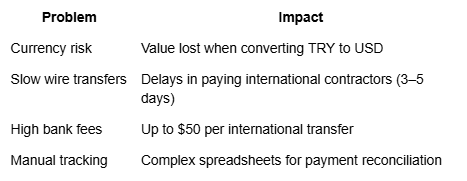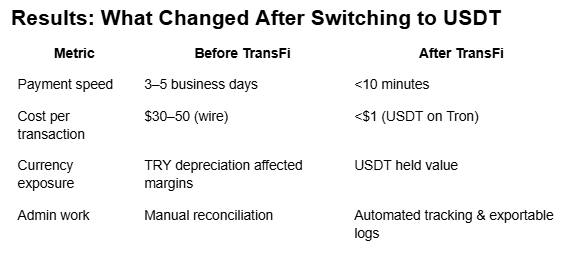In today’s globalized freelance economy, managing international contractor payments is a challenge for many small businesses—especially in emerging markets like Turkey. From currency instability to high transaction fees, paying remote talent efficiently and reliably is often easier said than done. That’s why one Turkish company decided to switch to paying contractors in USDT using TransFi, a move that significantly lowered costs, sped up payouts, and streamlined financial operations.
This blog explores how crypto payroll in Turkey is gaining ground, especially among SMEs looking for smarter ways to handle cross-border payments.
Why Stablecoin Payroll Is Gaining Popularity in Emerging Markets
Stablecoins like USDT (Tether) are digital currencies pegged 1:1 to the U.S. dollar, offering the price stability of fiat with the speed and cost-effectiveness of blockchain payments. For businesses in inflation-impacted economies, stablecoins present a compelling alternative to traditional banking methods.
Advantages of USDT for business payments:
- Fast settlements (often under 10 minutes)
- No banking intermediaries
- Lower transaction costs
- Borderless access to global talent
- Hedge against local currency depreciation
It’s no surprise that crypto payroll solutions are increasingly being used to pay remote workers in Eastern Europe, Latin America, Africa, and the Middle East—Turkey included.
Turkey’s Economic Landscape and the Rise of Stablecoin Payments
Turkey has experienced significant currency volatility, with the lira depreciating rapidly in recent years. This economic instability has encouraged businesses to explore dollar-pegged stablecoins like USDT and USDC for payroll, treasury, and cross-border transactions.
Key facts about stablecoin adoption in Turkey:
- Turkey consistently ranks in the top 10 globally for crypto adoption.
- The local freelance economy is booming, with many working for global clients.
- Regulatory clarity is improving, with the government planning crypto legislation to support innovation.
Stablecoins have emerged as a practical workaround to SWIFT limitations and slow bank transfers, especially when managing international contractor payments.
Case Study: A Software Startup in Istanbul Chooses USDT Payroll via TransFi
The Business
“CodeXperience” is a small Istanbul-based SaaS company that builds custom software for European and U.S. clients. The company works with 15+ remote contractors across Romania, Pakistan, and Brazil.
The Challenge
Before switching to USDT, CodeXperience faced the following issues:

Why They Chose TransFi
TransFi offered a fast, compliant, and cost-effective way to pay contractors in USDT, removing the need for expensive wire transfers and reducing financial friction.
Implementation: Switching to USDT Payroll via TransFi
Step 1: Onboarding & KYC
The company registered on TransFi and underwent basic KYC checks, completing onboarding in under 48 hours.
Step 2: Wallet Setup
TransFi helped the team set up wallets for their contractors who did not already have USDT addresses. The platform supports multiple chains including Ethereum, Tron, and Polygon.
Step 3: Sending Payments
Through TransFi’s intuitive dashboard, the finance team could:
- Select contractors
- Input payment amounts in USD or USDT
- Track successful transfers in real-time
Batch payments became possible, streamlining the entire monthly payroll cycle.
Results: What Changed After Switching to USDT

Contractor Feedback:
Contractors preferred USDT due to its speed, global accessibility, and ease of conversion to local currency through crypto exchanges.
Why TransFi Works for Small Businesses
TransFi provides a robust and easy-to-use stablecoin payroll platform designed for startups and SMEs. Its services are tailored for businesses operating in emerging markets who need to:
- Pay global contractors affordably
- Avoid delays and bank rejections
- Control FX risk
- Remain compliant with evolving regulations
TransFi supports mass payouts, multi-chain support, and fiat off-ramps, making it an ideal partner for crypto-native business operations.
Challenges and Considerations
While switching to USDT payments offers significant benefits, businesses should be aware of:
- Regulatory compliance: TransFi works with licensed entities and ensures AML/KYC standards.
- Volatility of certain blockchains: Choosing a cost-effective and stable chain like Tron helps.
- Educating contractors: Not all workers are familiar with wallets or crypto cashout methods—but this is improving.
- Accounting and tax: Proper reporting of crypto payroll is essential; TransFi provides downloadable logs and invoicing support.
The Future of Crypto Payroll in Turkey and Beyond
As Turkey continues to digitize its economy, crypto payments for freelancers and contractors are likely to grow rapidly. TransFi and other infrastructure providers are enabling SMEs to:
- Scale globally without traditional banking limits
- Retain more value by avoiding costly FX transactions
- Offer more flexible payment options to global talent
With stablecoins like USDT becoming increasingly mainstream, crypto payroll is no longer a niche—it’s a strategic advantage for small businesses in global markets.
Also read: Philippines’ Payment Rails & How They Work – From InstaPay, PESONet to GCash, Maya & Real-Time Transfers
Conclusion
This case study shows how a small Turkish business successfully transitioned to USDT payroll using TransFi, solving currency risk and payment inefficiencies. By embracing stablecoins, they improved cash flow, cut costs, and empowered their international team with faster and more reliable compensation.
As global commerce continues to evolve, tools like TransFi are at the heart of financial inclusion for businesses in emerging markets—making crypto-native payroll a powerful enabler of growth.
FAQs
Is it legal to pay contractors in USDT in Turkey?
Yes, while crypto is not legal tender, using USDT for business payments is allowed, especially through regulated platforms like TransFi.
What’s the benefit of using USDT over traditional bank wires?
USDT offers faster transactions, lower fees, and better protection from local currency fluctuations.
Can contractors easily cash out USDT?
Yes. Contractors can convert USDT to local fiat via crypto exchanges or use it directly if they prefer.
Is TransFi safe to use for business payments?
Yes. TransFi partners with compliant, licensed providers and ensures data security and transaction transparency.
What blockchains does TransFi support for USDT transfers?
Popular options include Ethereum, Tron, and Polygon—businesses can choose based on cost and speed.
Table of Contents
Suggested Article
Explore our products

Make global payments at the speed of a click

Accept payments, remove borders.

Unlock Seamless Digital Currency Transactions Anywhere
























